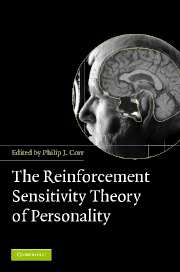Book contents
- Frontmatter
- Contents
- List of abbreviations
- List of figures
- List of tables
- List of contributors
- Preface
- 1 Reinforcement Sensitivity Theory (RST): introduction
- 2 The neuropsychology of fear and anxiety: a foundation for Reinforcement Sensitivity Theory
- 3 Animal cognition and human personality
- 4 The behavioural activation system: challenges and opportunities
- 5 Reinforcement Sensitivity Theory and personality
- 6 Reinforcement sensitivity scales
- 7 Performance and conditioning studies
- 8 Psychophysiological studies
- 9 Reinforcement Sensitivity Theory and mood induction studies
- 10 Neuro-imaging and genetics
- 11 Reinforcement Sensitivity Theory and psychosomatic medicine
- 12 RST and clinical disorders: anxiety and depression
- 13 RST and psychopathy: associations between psychopathy and the behavioral activation and inhibition systems
- 14 Behavioural activation and inhibition in social adjustment
- 15 Reinforcement sensitivity in the workplace: BIS/BAS in business
- 16 Formal and computational models of Reinforcement Sensitivity Theory
- 17 Reinforcement Sensitivity Theory: a critique from cognitive science
- 18 The contribution of Reinforcement Sensitivity Theory to personality theory
- General Index
- Index of Names
- References
18 - The contribution of Reinforcement Sensitivity Theory to personality theory
Published online by Cambridge University Press: 31 January 2011
- Frontmatter
- Contents
- List of abbreviations
- List of figures
- List of tables
- List of contributors
- Preface
- 1 Reinforcement Sensitivity Theory (RST): introduction
- 2 The neuropsychology of fear and anxiety: a foundation for Reinforcement Sensitivity Theory
- 3 Animal cognition and human personality
- 4 The behavioural activation system: challenges and opportunities
- 5 Reinforcement Sensitivity Theory and personality
- 6 Reinforcement sensitivity scales
- 7 Performance and conditioning studies
- 8 Psychophysiological studies
- 9 Reinforcement Sensitivity Theory and mood induction studies
- 10 Neuro-imaging and genetics
- 11 Reinforcement Sensitivity Theory and psychosomatic medicine
- 12 RST and clinical disorders: anxiety and depression
- 13 RST and psychopathy: associations between psychopathy and the behavioral activation and inhibition systems
- 14 Behavioural activation and inhibition in social adjustment
- 15 Reinforcement sensitivity in the workplace: BIS/BAS in business
- 16 Formal and computational models of Reinforcement Sensitivity Theory
- 17 Reinforcement Sensitivity Theory: a critique from cognitive science
- 18 The contribution of Reinforcement Sensitivity Theory to personality theory
- General Index
- Index of Names
- References
Summary
The breadth of Jeffrey Gray's contributions to psychology is barely touched in the various chapters of this book. This is not a criticism of the authors, but of the task that the editor set them. For to honor Jeffrey Gray in a single volume is an impossible task. As all of the contributers have said so well, Jeffrey was a remarkable man. Warm and caring to his friends and colleagues, linguistically skilled, familiar with theater and music in multiple languages, Jeffrey developed a biological model of personality that has become so well established that it has persisted even after he drastically changed it. To those who study personality psychology, the preceding chapters of this book are essential requirements that allow us to take advantage of the careful research and broad scholarship that went into Jeffrey Gray's work.
Personality theory is concerned with describing and explaining the observed complexity of individual differences in the patterning of affect, behavior, cognition and desires over time and space. At the descriptive level, there is moderately strong consensus that three to six broad domains can be used to organize how people describe themselves and others. People differ in the power they exert over others, in the affection they show others, in the quality of their work, in their tendency to react emotionally, in the openness of their interests to intellectual inquiry and in their basic intellectual ability.
- Type
- Chapter
- Information
- The Reinforcement Sensitivity Theory of Personality , pp. 508 - 527Publisher: Cambridge University PressPrint publication year: 2008
References
- 18
- Cited by

